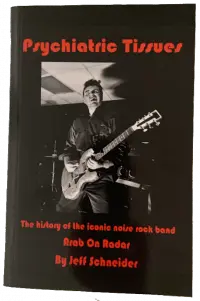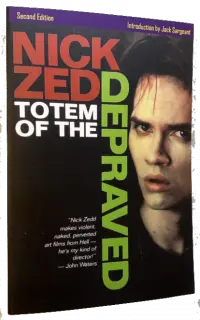Photo courtesy of Jeff Schneider
Providence, RI's Pig Roast Publishing brings a preservationist spirit to their enfant terrible foster home of newer bleeding edge authors/artists, releasing books by the unapologetic counter-culture anthropologist Lisa Carver (The Pahrump Report, No Land's Man), re-printing quintessential touchstones like Nick Zedd's Totem of the Depraved, and the recent out of left-field undertaking of the brilliant Freak Buck avant-comic anthology.
And no one else writes like Pig Roast Editor in Chief Jeff Schneider, author of Therapists Gone Wild and the audacious rock memoir, Psychiatric Tissues: The History of the Iconic Noise Rock Band Arab On Radar, in which Schneider not only describes the DIY punk underworld of the 90s/2000s, but does so in a language that actually reads rhythmically like his beloved post-hardcore act who were a cross between Captain Beefheart and The Crucifucks. If that sounds too gnarly for you, don't worry—Schneider has since fully committed to the quieter, gentler terrorism of the written word, where there's no need to shove toilet paper into your ear canal or wait in line for an overpriced beer only to piss it out ten minutes later.
Due to our age and steepage in underground multi-media art, back when it could still ferment properly beneath the floorboards, I’ve noticed you and I have a similar trajectory and attitude when it comes to literature, music, performance, and visual art kind of intertwining into the same general attitude and outlook. A lifestyle. When I read your claim that music “ended” culturally in 2009/2010, it rang so true to me, because that’s about the time I smelled something wrong and gravitated more towards literature as something that couldn’t be corrupted in the same way. Was it similar for you, this shift into writing as first priority? Explain your theory why music has ended, and why literature is still vital. How is it protected?
The opinion I have about Rock music being bookended 1955 – 2010 really triggers some people, unfortunately. I assume they are waiting for the next Punk or Grunge type of movement to emerge from the youth. With great heartbreak, I simply disagree, it ain’t coming back this time. I do not mean to hurt anyone’s feelings about what they are doing at all, and if you began playing music prior to 2010 and are continuing, that certainly deserves an asterisk. But yeah, my opinion is that Rock lived from Bill Haley and the Comets to Haley Dahl and Sloppy Jane, and that was a hell of a damn good run for Rock music. Rest in Peace Rock, you will never be forgotten.
On another note, pertaining to this, I’m quite intrigued by the writings and YouTube content of a philosopher named Hans-Georg Moeller. He proposes that we've gone through different periods: Sincerity and Authenticity, both of which he argues are over. He proposes that the phase we are in now is called Prolificity. In Prolificity, the role of, let’s say, a musician, is reduced to short attention span moments that the general peer (the popularity contest winners) blip upon and cheap tricks reign supreme. Thus, TikTok is the origin of the most famous music now. This is why genres like Rock music are either frozen, i.e. Metallica still playing their montage of hits, or mediocre, such as post-2010 Rock being far beyond mere influence or subtle imitation. There also is no scene investment to speak of, the majority of people simply do not socialize that way any longer. The ones who do seem to be larping, in an insular clique that operates for the most part in a vacuum. It appears that they have fun, but it does feel like an odd Renaissance Fair vibe to me.
Prolificity has certainly eclipsed all of the arts, architecture being a blatant example. For instance, McDonalds in 1990 had some character, now they are all bland grey boxes that resemble an iPhone, or a hotel in any major city. International homogenization has taken away our individuality, and the rights associated with having separate cultures are the ones that preserved our differences as expressed through our unique histories. Part of why I began publishing books was to resist this trend in literature on whatever miniscule level I can. I do not have a great argument as to why, other than literature, at least the fierce and feral stuff I read, feels too relevant to our times to fall apart the way that the music scene has. Outsider writers seem to be adapting better in the struggle against homogenization, whereas contemporary musicians are still reiterating ideas that were born decades ago. I imagine that the ability to adapt is the only protection that literature has ever needed.
To me, Pig Roast is capturing this sort of vintage spirit of pre-internet aesthetic and attitude, something not everyone may “get” but provides proof of its buoyancy through its defiant content. The Nick Zedd book, for example, is a reprint, therefore a time capsule of experience and outlook that might never be printed in today’s climate, yet its preservation is so important since we don’t see anyone else like him now. Is this a conscious business model, or something that is a merely a reflection of your taste and blind/visionary instinct?
Publishing Nick Zedd and Lisa Carver was a duty to keep their work alive and accessible to the public. I am trying to give people the benefit of the doubt that when presented with a cool book, one full of wild knowledge and amazing prose, perhaps they can get into it and enjoy the experience of reading as much as I do. Ironically, some of the most interesting responses I have received about the reissue of Zedd's biography, Totem Of the Depraved, have come from Zoomers. Currently, we are trying to be a little more selective about submissions because, like most publishers, I want every book we put out to be a meaningful and magical read, something to love.
You played in the noise-rock band Arab on Radar and wrote your memoir Psychiatric Tissues about those years. When you were in the moments of that incongruent chaos, were you journaling in preparation for this, or was it the last thing on your mind? How convenient is it to be a musician and writer? What makes Psychiatric Tissues a memoir worth reading, when there are so many rock memoirs out there? Could anyone from any band write a meaningful memoir about their experience, or has it been too homogenized, post 2009/2010?
 Luckily enough, when writing Psychiatric Tissues, there was already tons of stuff documented in the press about Arab On Radar. Referencing the old interviews and reviews helped me cobble together a rough timeline which I used faithfully to write the book. I also outreached many people who are fans of AOR to help me remember particular things. Some cool folks came forth with photos and stories that they allowed me to include, in my own words, in the development of the memoir. I wanted to write a book like Anthony Bourdain’s Kitchen Confidential but about the inner workings of the noise-rock/underground music scene of that time and give insight to the inner workings of AOR.
Luckily enough, when writing Psychiatric Tissues, there was already tons of stuff documented in the press about Arab On Radar. Referencing the old interviews and reviews helped me cobble together a rough timeline which I used faithfully to write the book. I also outreached many people who are fans of AOR to help me remember particular things. Some cool folks came forth with photos and stories that they allowed me to include, in my own words, in the development of the memoir. I wanted to write a book like Anthony Bourdain’s Kitchen Confidential but about the inner workings of the noise-rock/underground music scene of that time and give insight to the inner workings of AOR.
It is one of very few accounts of the 90s – 00s underground music scene. I have only heard of a handful of others that address that time period. The memoir covers everything from gigs with Marilyn Manson, Biz Marquee, Lightning Bolt, The Yeah Yeah Yeahs, on and on. It gets into our travels via the tour van to many insane places – Waco, Zagreb, Los Angeles, and New Orleans, to name a few. I wrote Psychiatric Tissues with the idea that Arab On Radar made music that was shocking and manic, fast tempo songs, abrasive noise, all with a working class vibe. I wanted to write it so it reads that way: fast paced, declarative sentences, insanity, low-brow prose, humor, situations popping from scene to scene with little explanation, definition, or examination. I kept it frenzied on purpose. Most of the hard work was in editing it to maintain this effect. I suppose anyone that is in a band can write a memoir but I think Psychiatric Tissues has a component of historical merit, one that may not apply elsewhere.
You’re just about to release No Land’s Man, the new book by Lisa Carver about living in Botswana. After decades of underground notoriety, she’s pushed her tendency of being this sorceress of extremes to throwing herself into these expat, stranger-in-a-strange land type scenarios, like she did by moving to Pahrump, NV in the middle of our political boiling point which she documented in The Pahrump Report. How did you get involved with Lisa and how does she fit into the whole Pig Roast operation besides as author? How does she get away with using so many exclamation points in her work? I don’t mind it because the writing is so good.
I wrote an email to Lisa asking to purchase some of her books, and offered to send her my memoir. A few months later, she wrote me back and welcomed me to join her and do readings in NYC. It was so kind of her. Lisa Carver is very, like, Buddhist or something. Lisa lets things happen; if they go well, she is present, if they go bad, she is present. She is extremely non-judgmental. But the funny thing, I think, is her ability, purposely or not, to do a human mash-up. I think Lisa loves to get the wildest, conflicting, weird, often hostile, people together. She gets all kinds in really close and she’ll just wind it up and see what the fuck happens. The psychodrama usually unfolds because she is immune to the awkwardness of things, or perhaps she thrives on it.
My wife Ruby Wells, who is an editor for Pig Roast Publishing, flew with me to Sweden to produce three short films Lisa had scripted, using Swedish actors. One evening a Swede asked Lisa to play the piano; she agreed, but the thing was she didn’t know how to play piano, and Lisa just attacked it, banging out songs which broke out into a massive sing-a-long. It was so, just, amazing. I had a three mile smile on all night. In her life Lisa has endured real horror and projected pure joy, yet manages to proceed down her own unique path. We love her so much.
As far as Lisa’s punctuation, hmm, I think she is journaling all the time, capturing what she witnesses, and her wisdom comes forth in her perspective. She is a masterful writer. Lisa also has a vast resume as a journalist, everything from writing for Vice, Penthouse, Vogue, not to mention publishing the best 90s zine ever, Rollerderby, which is an iconic and much appreciated work. I think she is just Always! Really! Into! It! Hell yeah.
What’s your ideal publisher/author relationship? Does it sometimes feel like a huge gamble investing in writers who lead or have led erratic, self-destructive, or bridge-burning lives? I’m thinking of the unfortunate way Nick Zedd passed right after you released Totem of the Depraved, or that other author disappearing after you released his.
 I really appreciate an author who is positive and strengths-based, willing to do live readings, promo, and yes, be a cheerleader of sorts for Pig Roast Publishing and reading books in general. I wish it were more like skateboarding, like, if you got signed to Baker or Chocolate or something, those skaters were hyped and worked hard on that collaboration. I know this is probably impossible because authors are free to sign bigger or just different agreements with multiple presses, no problem. But for me, I need to build up the crew. I think publishing provides an author an opportunity to join a team, even if it is only for one book. As you mentioned, Pig Roast Publishing has been a timeline of tragedies and weirdness. Authors dying, authors ghosting us, some renouncing literature entirely, some went crazy, all sorts of stuff. Now, I don’t want vanilla HR manager types but total psychotic meltdown cannot continue to be our trajectory.
I really appreciate an author who is positive and strengths-based, willing to do live readings, promo, and yes, be a cheerleader of sorts for Pig Roast Publishing and reading books in general. I wish it were more like skateboarding, like, if you got signed to Baker or Chocolate or something, those skaters were hyped and worked hard on that collaboration. I know this is probably impossible because authors are free to sign bigger or just different agreements with multiple presses, no problem. But for me, I need to build up the crew. I think publishing provides an author an opportunity to join a team, even if it is only for one book. As you mentioned, Pig Roast Publishing has been a timeline of tragedies and weirdness. Authors dying, authors ghosting us, some renouncing literature entirely, some went crazy, all sorts of stuff. Now, I don’t want vanilla HR manager types but total psychotic meltdown cannot continue to be our trajectory.
I recently interviewed sci-fi legend Michael Butterworth, who was both a writer and publisher, in which he claimed the two roles were nearly impossible to balance in the 70s/80s. How do you temper these two roles with yourself?
I agree. It borders on schizophrenia to do this. I love getting in the world of fiction with my writing, it gives me goals and the ability to occupy my time fantasizing about whatever I’m unearthing. Writing is digging. I guess I have an energetic outlook, perhaps based on curiosity, and also an ability to compartmentalize, for better or worse, between my family, career, writing, and being a publisher. There is a lot of teamwork in Pig Roast Publishing, it is not just me doing it all by myself.
And it hasn’t all been total insanity. In 2022 we published Freak Buck, the comics anthology featuring artwork by several established and new comic artists, which was a very exciting release for many people. It’s a privilege to publish a murderer’s row of the best comic artists going right now. In the comics community, this is a nugget that people are going to seek out for years to come.
In the 70s/80s I imagine everything to do with the literati had alternative meaning, because the publishing world was completely different from what it is now. A strong manuscript could get you published based on the merit of the writing. Imagine that. The stakes were higher because it was possible to be a Larry Brown type. The elitist mode many people were in was acceptable then because there was no feasible way to self-publish or be an indie-press, so you faced the giants. Presently, even though it is small potatoes, some people cannot shake off the old model, they see themselves as a character from fucking Annie Hall or something. I find that sort of pomp and circumstance applied to books to be goofy as shit.
I suppose I temper these roles by trying my best to be a team player in publishing who approaches things honestly. When writing I dig down to a layer of sociological extremes. If I could sum up Pig Roast Publishing and my own writing in one word it would be – considerate.
Get Psychiatric Tissues, Totem of the Depraved, and more directly from Pig Roast Publishing

About the author
Gabriel Hart lives in Morongo Valley in California’s High Desert. His literary-pulp collection Fallout From Our Asphalt Hell is out now from Close to the Bone (U.K.). He's the author of Palm Springs noir novelette A Return To Spring (2020, Mannison Press), the dispo-pocalyptic twin-novel Virgins In Reverse / The Intrusion (2019, Traveling Shoes Press), and his debut poetry collection Unsongs Vol. 1. Other works can be found at ExPat Press, Misery Tourism, Joyless House, Shotgun Honey, Bristol Noir, Crime Poetry Weekly, and Punk Noir. He's a monthly columnist for Lit Reactor and a regular contributor to Los Angeles Review of Books.








